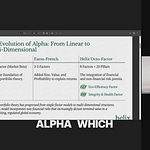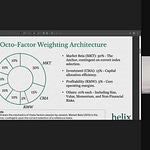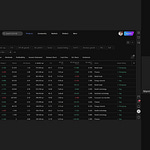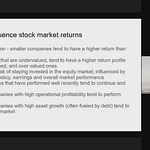Introduction
In the world of investing, it is easy to fall into the trap of using a single metric to make decisions. Investors often look for a simple answer, such as a low P/E ratio, a high dividend yield, or a company with strong recent growth. However, this approach can be misleading and dangerous. At Helix Research, we firmly believe in a multi-faceted approach to investing. We reject single-metric investing because it fails to capture the full picture of a company's health and potential.
The Flaws of Single-Metric Investing
P/E Ratio: The price-to-earnings (P/E) ratio is a popular metric that compares a company's stock price to its earnings per share. While a low P/E ratio can indicate an undervalued stock, it can also signal underlying problems. A company might have a low P/E ratio because its earnings are declining, its industry is facing headwinds, or it has a high level of debt.
Dividend Yield: A high dividend yield can be attractive to income-focused investors. However, a high yield can also be a red flag. A company might be paying out a large portion of its earnings as dividends, leaving little for reinvestment in the business. In some cases, a high dividend yield can be a sign that the company is struggling and the market expects the dividend to be cut in the future.
Revenue Growth: A company with high revenue growth can be exciting, but growth alone does not guarantee success. The company could be growing by taking on too much debt, sacrificing profitability, or operating in an unsustainable market. Additionally, high-growth companies often have high valuations, which can lead to significant losses if growth slows down.
Our Multi-Faceted Approach
At Helix Research, we believe that a comprehensive analysis is essential for making sound investment decisions. Our approach considers a wide range of factors, including:
Financial Health: We analyze a company's balance sheet, cash flow, and income statement to assess its financial health. We look for companies with low debt, strong cash flow, and consistent profitability.
Management Quality: We evaluate the management team's experience, track record, and alignment with shareholder interests. We prefer companies led by ethical and competent leaders who have a clear vision for the future.
Competitive Advantage: We look for companies with a sustainable competitive advantage, such as a strong brand, a unique product, or a low-cost structure. A competitive advantage allows a company to maintain its profitability and market share over the long term.
Industry Trends: We analyze the industry in which the company operates to understand the competitive landscape, growth drivers, and potential risks. We prefer companies operating in industries with favorable long-term trends.
Valuation: We use a variety of valuation methods to determine a company's intrinsic value. We look for companies that are trading at a significant discount to their intrinsic value, but we never base our decision on valuation alone.
Conclusion
Investing is a complex endeavor that requires a holistic approach. Relying on a single metric can lead to poor decisions and significant losses. At Helix Research, we reject single-metric investing and instead use a comprehensive, multi-faceted approach to identify high-quality companies with long-term growth potential. We believe that this disciplined approach is the key to achieving long-term investment success.
Disclaimer: This blog post is for informational purposes only and does not constitute financial advice. Please consult with a qualified financial advisor before making any investment decisions.










